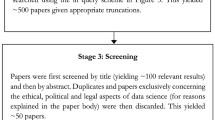Abstract
Since the 1960s. thematic analysis has been introduced as a new tool for understanding the success or the failure of individual scientific research projects, particularly in their early stages. Specific examples are given, as well as indications of the prevalence of themata in areas beyond the natural sciences.
Similar content being viewed by others
References
American Association for the Advancement of Science: Project 2061.Benchmarks for Science Literacy (Oxford University Press, New York. 1993).
Berlin, I..The Crooked Timber of Humanity (Random House, New York, 1992).
Crombie, A. C.,Styles of Scientific Thinking in the European Tradition (Duckworth, London, 1994).
Holton, G.,Thematic Origins of Scientific Thought: Kepler to Einstein (Harvard University Press, Cambridge, 1973; 2nd revised edition, 1988).
Holton, G.,The Scientific Imagination (Cambridge University Press, 1978).
Holton, G.,The Advancement of Science, and its Burdens: The Jefferson Lecture and Other Essays (Cambridge University Press, 1986).
Holton, G.,Science and Anti-Science (Harvard University Press, Cambridge, 1993).
Holton, G.,Einstein, History, and Other Passions (American Institute of Physics Press, 1995; Addison-Wesley, 1996).
Kent, A. (Ed.),Encyclopedia of Library and Information Science. Vol. 61. Supplement 6 (Marcel Dekker, New York, 1987), pp. 332–339.
Merton, R. K., “Thematic analysis in science: Notes on Holton's concept,”Science 188, 335–338 (1975).
Rutherford, F. J. and Ahlgren, A.,Science for All Americans (Oxford University Press, New York, 1990).
Sonnert, G., and Holton, G.,Gender Differences in Science Careers: The Project Access Study (Rutgers University Press, New Brunswick, 1995).
Sonnert, G., and Holton, G.,Who Succeeds in Science? The Gender Dimension (Rutgers University Press, New Brunswick, 1995).
Author information
Authors and Affiliations
Rights and permissions
About this article
Cite this article
Holton, G. The role of themata in science. Found Phys 26, 453–465 (1996). https://doi.org/10.1007/BF02071215
Received:
Issue Date:
DOI: https://doi.org/10.1007/BF02071215




